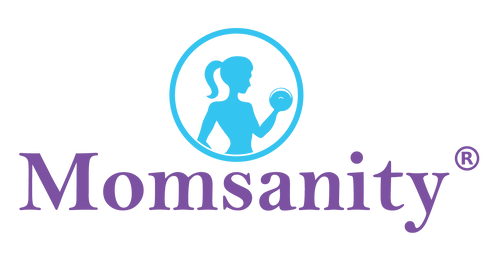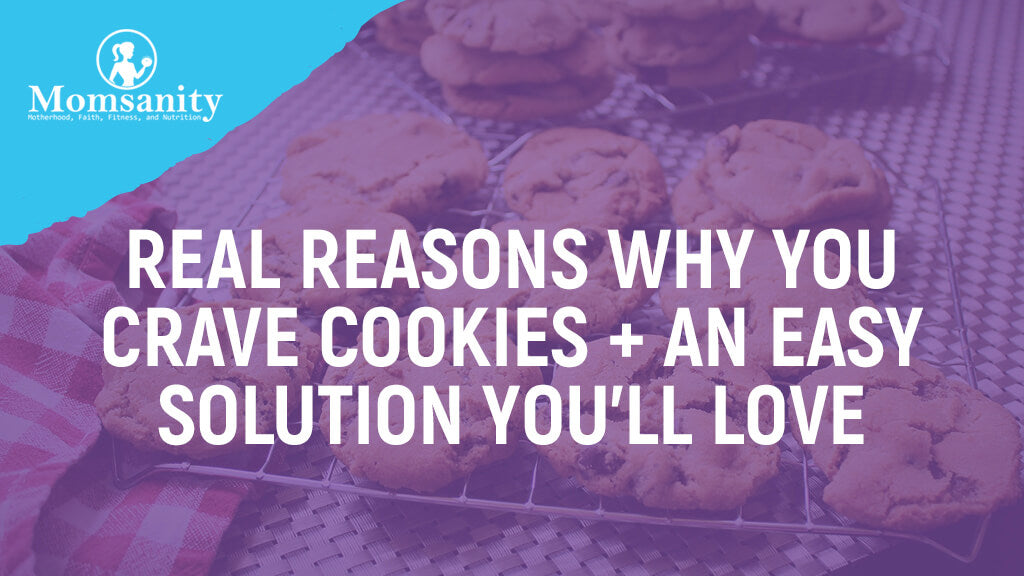If you asked me what my favorite dessert is, I’d tell you it’s warm chocolate chip cookies fresh out of the oven! As a kid, I used to grab a spoon and snack on the tube of raw chocolate chip cookie dough! I am such a chocolate lover with a constant sweet tooth! Years ago, before I started focusing on my nutrition, I used to bake chocolate chip cookies every night for my husband and me to enjoy after the kids had gone to bed as a treat. It’s so easy to reward ourselves with such an addictive dessert, right?
6 Real Reasons Why You Crave Cookies
Hunger
One sure way to open yourself up to cravings is to eat TOO LITTLE. In fact, it can set you up for a vicious cycle of cravings and overeating. Undereating can happen if you don’t follow a regular eating schedule, ”forget” to eat because you’re too busy, skip meals, or drastically cut your calories because you want to drop a few pounds fast. Each of those scenarios can lead you to feel legitimately hungry – and maybe even leave you feeling “hangry” (hungry + angry) because your blood sugar levels drop. That can lead to craving high-calorie foods. And, because you haven’t eaten enough all day, you may start to think you “deserve” the extra calories or fatty/sugary foods.
Instead, stay on top of hunger by eating wholesome foods throughout the day. Load up on nourishing protein, vegetables, fats, and complex carbs because when you are happily satisfied, your cravings for sweets like cookies and ice cream will naturally reduce.
Nutrient Deficiency
A deficient diet lacks variety and key nutrients like protein and fiber. And nutrient deficiencies affect more than just our weight. They can have significant health implications too!
When our menu is low in protein and fiber, it results in hunger and cravings, even when we’ve eaten enough calories, and often causes us to crave carbs and fats.
It doesn’t take long for your diet to get out of balance if you:
- Drink a lot of soda or other sugary beverages
- Focus on calories vs. the quality of those calories (and their hormonal impact)
- Eat a lot of processed foods
A balanced diet matters because it’s the nutrients in your food that keep you feeling full – especially the protein, fiber, and healthy fats they contain. Your body may lack chromium, carbon phosphorous, sulfur, tryptophan, and magnesium. Ensuring you get enough quality nutrients will go a long way toward keeping you feeling full, satisfied, and energized. Otherwise, your blood sugar can go on a crazy up-and-down ride, which leads to craving foods that give you a quick pick-me-up.
Stress
Emotions can also contribute to food cravings. That’s why we talk about “comfort foods” and “comfort eating” or “emotional eating,” which usually involve foods that are sweet or high in carbs and fat.
Stress doesn’t just put you in an overwhelmed mood – it affects your hormones which, in turn, causes cravings, especially for sweet foods!
Here’s a quick rundown of what can happen. When you get a sudden jolt of stress, at first, it might cut your appetite as your body goes through its fight-or-flight response. But if the stress continues, your body releases cortisol, which boosts your appetite.
Stress activates the brain's reward centers, making us crave foods that soothe some of our body’s stress responses (including emotions), such as high-calorie foods, fat, sugar, or all three! And when you’re stressed, you probably don’t sleep very well. So tack on the cravings-boosting sleep deprivation hormonal responses, as well!
When we stress chronically, the hypothalamus & pituitary (the command and control center of your hormones) become "irritated"; this negatively impacts your thyroid, adrenal, and ovarian hormone production. Chronic stress in women leads to increased testosterone and lower estrogen and progesterone.
Not only does stress raise testosterone, lower estrogen, and negatively impact insulin in women, but it also causes increased hunger, constant cravings, and a physiology that is more likely to lose muscle (and resist weight loss).
When we give in to cravings, the body makes new fat cells and enlarges those fat cells. When stressed, the cortisol hormone rises. So we combine cortisol with insulin and get belly fat.
It is imperative to reduce our stress (and get ample sleep) in order to reduce cravings. Enjoying stress-reducing activities like - reading a book, exercising, resting, spending time outside, stretching, walking, praying, enjoying a hobby, saying no, etc. - helps us naturally reduce cravings too!
Low Blood Sugar
Many people believe carbohydrates cause cravings – but that can be because of the TYPE of carbohydrates they are choosing. Eating – or drinking – refined (processed) carbs shoot your blood sugar up and then quickly back down again. And these blood sugar fluctuations can leave you feeling hungry for even more! Refined carbs are found in processed foods, cookies, cakes, most snack foods, and anything containing sugar, white/processed flour, white rice, etc.
Energy levels are a direct reflection of blood sugar levels.
- Looks like this: eat = increase in blood sugar.
- Increase in blood sugar = release of insulin = lowered blood sugar.
- Insulin response correlates with: amount / type of carb / volume of calories in meal.
- A huge blood sugar surge = huge insulin surge (relaxed/lethargic) = overcorrect into low blood sugar = release of stress hormones (cortisol/adrenaline/glucagon) to mobilize sugar back into blood = feeling wired.
- That creates an ongoing roller coaster of blood sugar levels. Too much insulin = tired and sluggish (like 2 pm slump). Too much cortisol = wired at the wrong times (ex: can’t sleep at night).
Instead of reaching for those refined sugars to get a quick boost, we want to enjoy a variety of healthy foods in their natural state throughout the day. We feel “level” without any blood sugar dips when we enjoy proteins, vegetables, fats, and complex carbs.
Lack of Energy
As previously mentioned, energy levels directly reflect blood sugar levels. Fatigue sets us up to make poor decisions and reduces our ability to control impulses or urges. Fatigue also revs up our brain’s reward centers, making it challenging to resist comfort foods and late-night snacking. Exhaustion prompts us to eat larger portions and increases cravings for energy-dense, high-carbohydrate foods.
Getting enough quality sleep can have a tremendous impact on your overall health, energy, and well-being. Poor sleep can be one of the TOP causes of your cravings running wild! That’s because your appetite is affected by hormones – leptin and ghrelin – that go up and down over the course of each 24-hour period. And being sleep deprived disrupts those fluctuations, which affect not just your appetite and cravings but also your metabolism. You feel hungrier and have more cravings. Your body never feels fully satisfied when you eat.
The hormone imbalance makes your body believe there’s an energy shortage, so it slows down your metabolism and stores the food you eat as fat.
Eating to 80% fullness will also help stabilize energy. Tools that help with energy management: eat FIBER (blunts the insulin response of meal, lowers insulin response = fibrous vegetables, starchy vegetables, high-fiber grains) and eat PROTEIN (feel more satiated, so we don’t scarf down meal; lower insulin response). Limit STIMULANTS and SEDATIVES (caffeine, alcohol, THC, nicotine). In addition, troubleshoot EXERCISE (reduce moderate-intensity long-duration workouts; instead, try high-intensity / short / weight-lifting / low-intensity restorative exercise).
Hormonal Changes
Hormone changes and imbalances due to stress, pregnancy, or lack of sleep cause us to crave fats and sugars (which have a calming effect).
Every month we as women go through the PMS cycle of hormones, bloating, cravings, mood swings, and fatigue. The week or two before our cycle starts, our serotonin levels drop. Serotonin is a hormone that regulates mood, sleep, and eating behaviors.
Instead of indulging in chemical-filled refined sugars that worsen premenstrual symptoms (like headaches, irritability, and bloat), we want to balance our brain chemicals (where cravings originate), which regulate mood, sleep, and eating behaviors.
Cocoa is a natural antidepressant! It releases serotonin, dopamine, and endorphins. These "happy" hormones make us feel euphoric as they light up the pleasure center of our brains (as cocaine does, except this is healthy and legal).
An Easy Solution to Satisfy Your Cookie Cravings We Know You’ll Love
What’s our solution when sugar cravings strike?
Introducing CRAVE, the cocoa blend that naturally satisfies! Momsanity's CRAVE cocoa blend provides an instant "chocolate fix" without the guilt. It’s a sweet and healthy treat that can be prepared in so many different ways!
CRAVE is decadently delicious and erases cravings while benefiting your body. Made from nature, CRAVE is a tasty way to improve brain and heart health, control blood sugar and weight, reduce inflammation and enhance calmness while satisfying your cravings.
Low-calorie CRAVE contains no artificial sweeteners, no artificial flavors, no preservatives, no GMOs, no dairy, no soy, and no gluten.
Our captivating confection is packed with antioxidants. It’s a quick and healthy treat the entire family can enjoy in beverages and easy desserts.
Science-Backed Health Benefits of CRAVE Cocoa Powder:
1. Antioxidants and Minerals.
Both can help prevent cancer, improve cardiovascular health, blood circulation, and more!
2. Can Help Prevent Cancer.
Flavanols in cocoa can reduce cell damage which stunts the possible development of cancer (breast, pancreatic, prostate, liver, colon, and leukemia, in animal studies).
3. Balances Blood Sugar.
Cocoa helps improve the breakdown of glucose and enhances insulin sensitivity helping our blood sugar to remain more stable.
4. Lowers Blood Pressure.
Cocoa powder boosts the availability of nitric acid, which helps dilate blood vessels and lowers blood pressure.
5. Reduces Bad Cholesterol.
Consuming cocoa consistently has been shown to increase good (HDL) cholesterol and reduce bad (LDL) cholesterol while lowering the risk of heart attack and stroke.
6. Enhances Heart Health.
The antioxidants and magnesium in cocoa help to strengthen the heart and protect cells.
7. Boosts Energy Without the Crash.
Cocoa contains fewer stimulants than coffee but has the same uplifting effect.
8. Assists in Weight Loss.
Polyphenols in cocoa help the metabolism with fat burning (while reducing inflammation). Cocoa helps regulate energy use, reduces appetite, and increases fat oxidation and feelings of fullness.
9. Reduces Stress.
Cocoa helps to negate cortisol, the stress-induced hormone, helping you relax and even reduce depression.
10. Slows Down Aging & Helps the Brain.
Cocoa helps to improve skin hydration, elasticity, and even sun protection. Adult brains eventually stop replacing dead/dying neurons; antioxidants counteract the damaging effects of free radicals and may reverse memory loss. And the primary flavonoid in cocoa, epicatechin, has been proven to improve cognitive function.
11. Improves Mood.
Cocoa is fantastic for stimulating mood-enhancing neurotransmitters.
Download a FREE copy of our CRAVE Recipes to see all the irresistible ways you and your family can enjoy Momsanity’s CRAVE Cocoa Blend.

